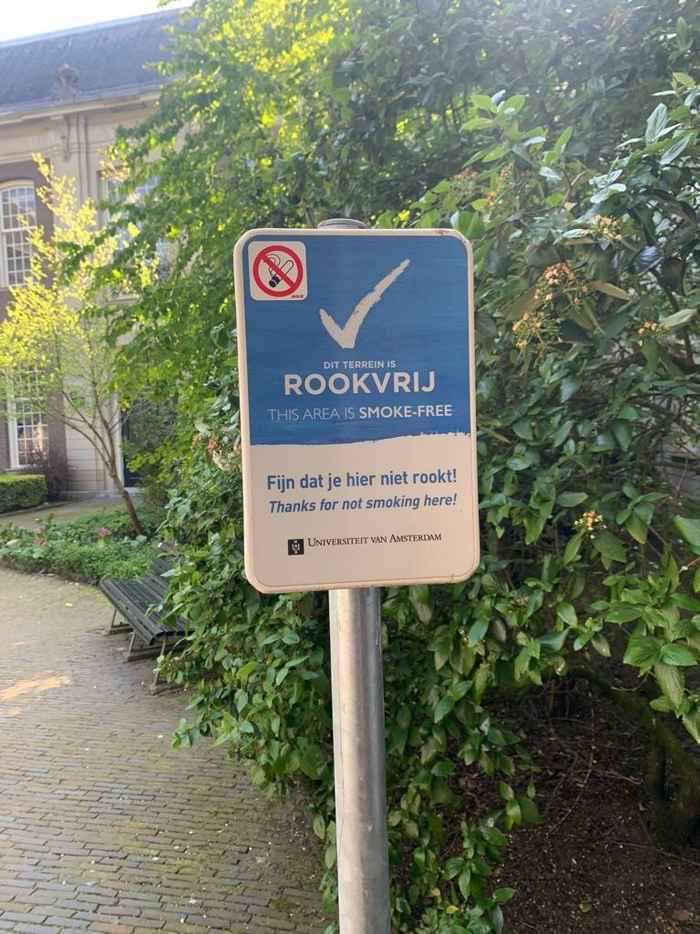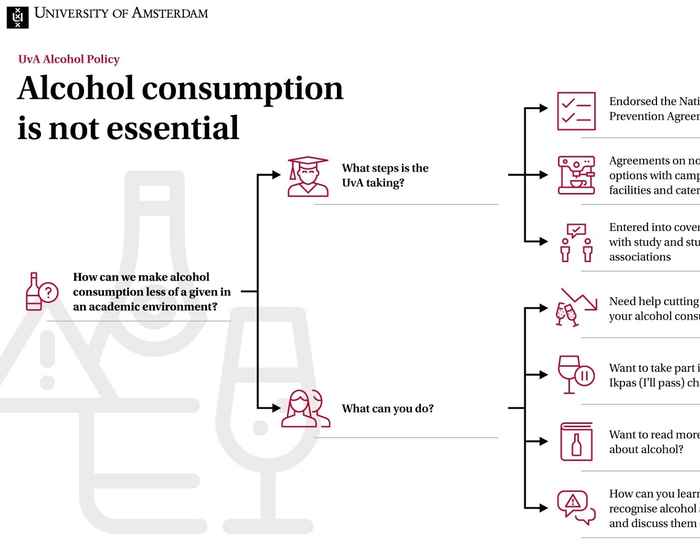House rules and code of conduct
-
Report something or ask a question
You can contact the receptionist or security guard if you have questions, experience nuisance or for lost/found items.
-
Smoke-free campuses
All UvA campuses and buildings are smoke-free. Since 1 August 2020 all educational institutions in the Netherlands have been smoke-free. This applies to everyone who uses the buildings and locations, including students, employees and visitors. You can recognise this area by the sign, banner or poster with the smoke-free image and the message: 'This area is smoke-free'. We ask smokers to also observe this rule in the vicinity of the campus and not to cause nuisance for local residents. The security guards can tell you exactly where the smoking ban begins and ends.

-
Alcohol policy
The focus of the UvA alcohol policy is on discouraging alcohol consumption at the university. Alcohol will continue to be available on campus, but the new policy requires caterers, campus hospitality and event organisers to offer attractive non-alcoholic alternatives. In the coming years, the UvA will also pay attention to raising awareness of the consequences of problematic or excessive alcohol consumption and offering help to heavy drinkers.
What steps is de UvA taking
Endorsed the National Prevention Agreement
The National Prevention Agreement sets out specific long-term goals for the improvement of public health. Universities have agreed to reduce the number of excessive and problematic alcohol users. The Association of Universities in the Netherlands (VSNU), of which the UvA is a member, has committed itself to this objective.
Agreements on non-alcoholic options with campus catering facilities and caterers
A wide and appealing range of non-alcoholic beverages are provided at campus catering outlets, drinks receptions, conferences and events.
Covenant agreements with study and student associations
A covenant on 'alcohol and social safety' has been signed with student associations and agreements on the consumption of and approach to alcohol are being made with student associations.
What can you do?
Want to reduce your alcohol consumption?
Don't be afraid to ask for help, you don't have to do it all by yourself. The sooner you deal with your problems, the better it will be for your health.
Students can contact their own GP, the UvA General Practitioners Practice, a student psychologist, student counsellor or the study adviser at their own degree programme. Staff members can contact their own GP and/or the occupational physician, who holds preventative consultations (see Illness and recovery in the A-Z list in the staff sites).
Take part in the Ikpas (I'll pass) challenge
Have you unconsciously developed a pattern of drinking alcohol almost every day? Have you ever wondered what kind of influence this has on you and what would happen if you broke the pattern? Or maybe you have an important test, paper or sports match that you want to be at your best for and you'd like to try not drinking for a month. If any of these situations apply to you, you should definitely consider trying an IkPas-challenge.
IkPas (I'll pass) is motivational platform that challenges you not to drink for a month. The platform is free to use as a UvA student and not only has the option to join on your own but also to join as a group. Not only does an IkPas challenge give you real-life insight into the benefits of not drinking alcohol for a while, it is also a good opportunity to reflect on your own alcohol consumption and to practice abstaining from alcohol.
Want to read more about alcohol?
The National Institute on Drug Abuse and Audit offers information, self-tests and offline self-help tools to help you stop drinking or reduce your alcohol intake. Free apps such as the Try Dry-app can help you prepare for situations in which you might struggle to avoid drinking altogether or avoid drinking too much so that you can stick to your own limit. Check out BBC GoodFood for inspiring non-alcoholic alternatives.
How can you learn to recognise alcohol abuse issues and discuss them openly?
Signals of potential alcohol abuse include showing up late on a regular basis, self-neglect, changes in terms of behaviour, emotions or interests.
If you suspect that your co-worker or fellow student is abusing alcohol, try to discuss this with them. You can start the conversation by telling them that you are worried and asking if it would be alright to discuss the situation together.
Alcohol abuse is still a taboo subject, so be mindful of the words you use to describe the situation. Figure out the best follow-up steps together. If you need help in how to have this conversation, read the conversation guide. (PDF, 4 p.)
- Taking photos and videos to share on social media
-
Events and distributing information
Not permitted are expressions of a cultural, political and/or religious nature or with commercial purposes and the organization of activities and/or the distribution of written or oral information with the above purpose, such as putting up posters, handing out flyers, submitting magazines or placing stands.
Under certain conditions the following is allowed:
- Making video and sound recordings. You need prior approval for this. Please contact the Facility Services for this.
- Flyering and similar activities for education and research related topics. Please contact the Facility Services in advance.
- Organizing events. Please contact the Facility Services event coordinator in advance.
-
Enforcement
In the event of nuisance or violation of the law, the UvA can deny access to work, education or building/facility/site in accordance with the collective labour agreement, WHW or current legislation.
During enforcement, clothing and accessories should not hinder identification.
-
Protest
Before and during the summer, there was extensive discussion about the UvA's house rules. In particular, the wording on where and when you can and cannot demonstrate was not clear enough.
Therefore, an update of those house rules was started before the summer, which also took the reactions of students, staff, the Dutch Trade Union Confederation (FNV) and several other civil society organisations into account. The UvA's Central Works Council and the Central Student Council are the main partners in this process and have been granted the right to be consulted (adviesrecht) on this topic. More information will follow.
-
Use of buildings and facilities
The buildings, the spaces and facilities therein or associated with them, and the grounds can only be used for their intended purpose: for education, research and all related activities. It is not allowed to bring and use private kettles, coffee machines, sandwich makers, etc. in the office and other work spaces or in the pantries.
-
Clean and tidy spaces
To ensure that our campus environments stay clean, tidy and liveable for everyone, please leave your work or study place clean and park bicycle, scooter or car in the designated areas. It is not permitted to make changes on doors, windows and walls. Posters and other information material can be put up on the assigned wall notice boards.
-
Escape routes
For everyone's safety it is imperative that escape routes are kept clear at all times.
